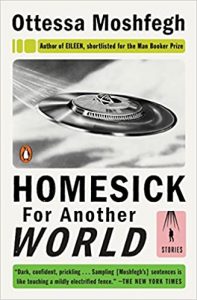The narrator in this story believes that they have a story to tell when there are red bugs found on the elm tree that grows in his yard, and his neighbor tells him that he needs to chop down the tree so that his own elm trees don’t get infested. This is an important issue for the narrator, given that the elm tree in his yard is over 200 years old, and has been around for longer than he has been alive. It would seem as though the narrator is mainly either writing or thinking, as he begins the story by relaying his personal biography to an audience of some kind. Otherwise, he speaks with Mr. Pike on occasion, but the majority of the narration is not relayed to the reader through dialogue. As the reader, it feels as though the narrator is confiding in us throughout the story, as he never mentions any of the internal struggle he is going through to his wife or anyone else. I would describe the nature of this presentation as a reflection of the narrator aging in comparison with this elm tree that needs to be cut down in order to make way for new life. The narrator describes his relationship with his wife as good, but they almost never interact with each other throughout the entirety of the story. He also mentions that his wife does adventurous things without him, by saying, “Age, it seems, has left my wife alone. She ice-skates and will swim nude in a mountain lake. She does these things without me, however, for now my life has slowed” (pg 3). Perhaps the narrator thinks that by preserving the elm tree, he is also proving that he has some relevance in modern society and a reason to continue living despite the setbacks in his health. It seems that he feels as though he is being left behind by everyone he knows, with his wife continuing to enjoy the adventures they used to go on together by herself and Mr. Pike determined to clear his elm tree and preserve his own young ones.
The tone of this story is mostly downcast, due to the many things in the narrator’s life that he now has to miss out on, and the impending death of a tree that has been a constant in his life. Towards the end of the story I would say that it becomes almost vengeful towards Mr. Pike, with the narrator’s plot to release the insects on his elm trees as well. But once he gives up on that plan, the tone of the story becomes more wistful. It seems as though the narrator has some regrets, and some things he wishes he could still do despite age catching up with him. I think that the narrator changes over the course of this story by realizing more all the things that he could have accomplished in his lifetime, and recognizing that there are some things he is no longer able to do. This realization is a hard one for many of us as we get older; everyone has regrets of one kind or another from time to time, and aging is a fact of life that not everyone is ready to face. This story represents the constant movement of time, and how we may try to resist changing times or death and decay, but it will always continue on whether we like it or not.

 The point of view was very different as well in comparison to the narrators in all of her other stories as well. For one, the narrator in this story is a young child, who has a voice that is very detached and contradicts the typical internal monologue of a young girl. The narrator believes that this story is about finding relief from the pain of being in her own body, and that in order to go back to where she originates from she needs to either die or find the person that she needs to kill. Everyone in this story has odd sounding names, which originally made me believe that this was just a kids’ game or something similar to begin with. However, the way that the narrator takes this so seriously leads readers to think that there is more at play here than what meets the eye. The narrator, Urszula, tends to be thinking to herself more than speaking or writing throughout the story, and she internalizes most of her thoughts and opinions. Even so, she still interacts with Waldemar often without saying much of anything, and the connection that they have is maximized upon, especially with Waldemar’s reluctance to let the narrator try to kill Jarek Jaskolka. A prime example of this is when Urszula states, “I try to sound cheerful, like I don’t know that Waldemar’s heart is broken. He can see right through me, He has that ability, as my brother” (pg 288).
The point of view was very different as well in comparison to the narrators in all of her other stories as well. For one, the narrator in this story is a young child, who has a voice that is very detached and contradicts the typical internal monologue of a young girl. The narrator believes that this story is about finding relief from the pain of being in her own body, and that in order to go back to where she originates from she needs to either die or find the person that she needs to kill. Everyone in this story has odd sounding names, which originally made me believe that this was just a kids’ game or something similar to begin with. However, the way that the narrator takes this so seriously leads readers to think that there is more at play here than what meets the eye. The narrator, Urszula, tends to be thinking to herself more than speaking or writing throughout the story, and she internalizes most of her thoughts and opinions. Even so, she still interacts with Waldemar often without saying much of anything, and the connection that they have is maximized upon, especially with Waldemar’s reluctance to let the narrator try to kill Jarek Jaskolka. A prime example of this is when Urszula states, “I try to sound cheerful, like I don’t know that Waldemar’s heart is broken. He can see right through me, He has that ability, as my brother” (pg 288). one of her characters trying to escape from theirs. “A Better Place” was filled with the aspects of other stories from hidden trauma, fear, and (in all honesty) a slight insane main character. Yet, to me this is what made it so inherently entertaining to read.
one of her characters trying to escape from theirs. “A Better Place” was filled with the aspects of other stories from hidden trauma, fear, and (in all honesty) a slight insane main character. Yet, to me this is what made it so inherently entertaining to read. al topic and flips it into the realistic. She leaves out no detail too small and creates a world the reader could attempt to relate to. The story is not so clean and shiny, but slightly gray and foggy.
al topic and flips it into the realistic. She leaves out no detail too small and creates a world the reader could attempt to relate to. The story is not so clean and shiny, but slightly gray and foggy.